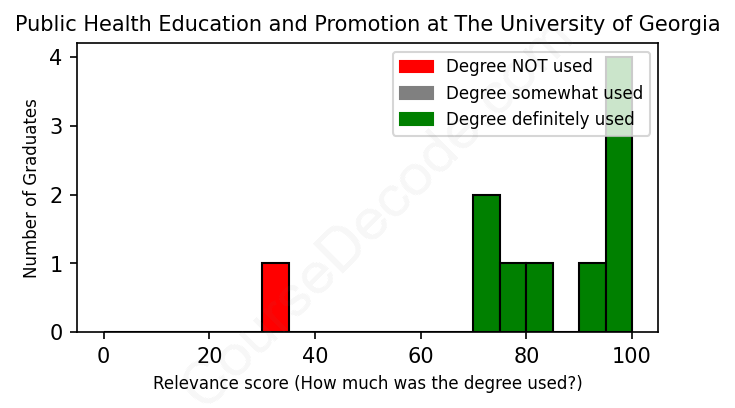
First, some facts. Of the Public Health Education and Promotion graduates from The University of Georgia we've analyzed , here's how many have used (or NOT used) their degree in their career:

These are estimates based on AI analysis of 10 LinkedIn profiles (see below).
The verdict? Significantly above average. Overall, with an average relevance score of 82%, Public Health Education and Promotion graduates from The University of Georgia have a much higher likelihood (+15%) of finding work in this field compared to the average graduate across all fields:
And for comparison, here's the chart for all profiles we've looked at across all degrees.
Also, after graduating, 50% of these graduates have pursued further education other than another Bachelor's degree (such as a Masters degree or other), compared to the average across all profiles of 35%. This suggests you may need more than just a Bachelors degree to be competitive as a Public Health Education and Promotion graduate.
See the details:
|
Relevance score: 31% We think this person has NOT gone into a career related to their degree. We think this person has NOT gone into a career related to their degree.
DEGREE INFOGraduated in 2015 from The University of Georgia with a Bachelor of Science (B.S.) in Public Health Education and Promotion. No other secondary education since. JOB HISTORY SINCE GRADUATIONWellness Intern St. Mary's Health Care System Jan 2015 - May 2015 Recruiter - Technology Services  TEKsystems Jun 2015 - May 2016 Account Manager - Technology Services  TEKsystems May 2016 - Mar 2019 Business Development Manager  Roadie Apr 2019 - Present ABOUTFocused on customer success in information technology. Skilled in Program Management and Sales Leadership. Strong information technology professional with a Bachelor of Science (B.S.) in Public Health and Promotion from The University of Georgia. |
The top 10 most common jobs done by the graduates we've analyzed (ranked most common to least) are:
When looking at the variety of jobs that graduates with a degree in Public Health Education and Promotion from The University of Georgia have pursued, a few common themes emerge. A significant number of these positions are directly related to public health, especially roles like Public Health Educator, Community Health Worker, and various internships within healthcare organizations. Many graduates have gained practical experience through internships or as fieldwork students, where they could apply their public health knowledge in real-world settings focused on health education, community outreach, and patient care. These experiences seem to truly align with the principles of Public Health Education and Promotion, showing that graduates are often utilizing their skills in ways that impact community health positively.
However, it's also important to note that not every position is directly relevant to public health. Some graduates took roles in areas like technology services or administrative positions, which don't leverage their public health training. For instance, being a recruiter or account manager in a tech company might not utilize the public health education skills they obtained during their studies at all. Overall, while many graduates have found fulfilling positions that are very much aligned with their degree, several have ventured into unrelated fields, indicating a mixed relevance of their job paths post-graduation. Ultimately, their journey reflects a blend of direct public health involvement and roles where those skills might not be the primary focus.
Here is a visual representation of the most common words in job titles for Public Health Education and Promotion graduates (this is across all Public Health Education and Promotion graduates we've analyzed, not just those who went to The University of Georgia):

Graduates from the University of Georgia with a degree in Public Health Education and Promotion seem to have varied career trajectories, but many have transitioned into solid roles that align with their field of study. For their first job after graduation, many land internships or entry-level positions in health care and community health, such as interns at local hospitals or health organizations. For instance, some graduates have started as wellness interns or held research assistant roles, which is a promising start as these positions provide them with relevant experience and insider knowledge of the health industry.
Five to ten years down the line, the data indicates that many alumni have successfully advanced into more established roles. Some have become public health educators, health specialists, or even transitioned into nursing roles—showing a clear progression in their careers. It’s also notable that there are graduates who pivoted their careers towards related fields like occupational therapy or health project management. While there is still a small segment that has ventured into seemingly unrelated sectors, the majority have found their way into roles that leverage their public health education, leading to a career trajectory that generally looks positive and relevant to their studies. So overall, if you're considering this degree, the prospects seem promising!
Hey there! So, if you’re looking into a Bachelor’s degree in Public Health Education and Promotion at The University of Georgia, it’s pretty standard in terms of difficulty—kind of like a solid middle ground. You’ll definitely have your share of challenging classes, especially when it comes to statistics and research methods, but there’s a good mix of hands-on projects and engaging coursework that keeps things interesting. Plus, if you’re genuinely passionate about public health and helping communities, it can feel less daunting. Overall, it's not a walk in the park, but it’s manageable if you stay on top of your work and make use of campus resources like tutoring and study groups!
Most commonly, in the LinkedIn profiles we've looked at, it takes people 4 years to finish a Bachelor degree in Public Health Education and Promotion.
So, when you look at these University of Georgia grads' job paths, it kind of paints a mixed picture about how much they've been making. The first grad, who's climbed up to a Business Development Manager role, likely pulls in a decent salary—those tech-related roles can pay well. The second grad seems to have started in lower-paying roles but eventually became an Occupational Therapist, which generally pays pretty well, so they’re probably doing alright now. The third grad seems to have worked their way up through research roles, and working as a Public Health Educator can also pay decently, but maybe not as much as the others. The more recent graduates are still building their careers, with a mix of internships and entry-level jobs which usually come with lower paychecks. So, overall, yeah, some of them seem to be earning good money, while others might still be in the grind, but in the long run, many of these pathways can lead to solid incomes in public health.
Here is a visual representation of the most common words seen in the "about" section of LinkedIn profiles who have a Bachelor degree in Public Health Education and Promotion (this is across all Public Health Education and Promotion graduates we've analyzed, not just those who went to The University of Georgia). This may or may not be useful:

Here are all colleges offering a Bachelor degree in Public Health Education and Promotion (ordered by the average relevance score of their Public Health Education and Promotion graduates, best to worst) where we have analyzed at least 10 of their graduates:
| College | Score | Count |
|---|---|---|
 The University of Georgia The University of Georgia
|
82 | 10 |
 University of Florida University of Florida
|
64 | 12 |
 University of Utah University of Utah
|
54 | 10 |